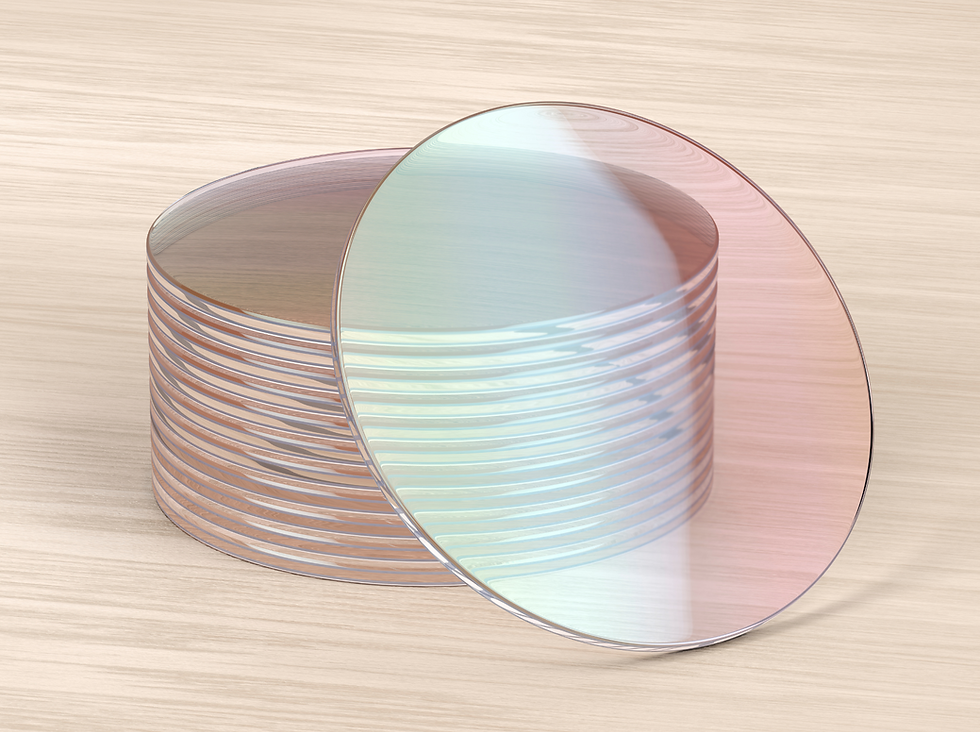Best Eye Vitamins
- Maria Bogoeva

- Jan 8, 2024
- 4 min read
Updated: Aug 5, 2024
Nurturing your vision starts with the supplemental and dietary choices you make. In this guide to the best vitamins for eye health, you will learn more about their functions. You will also learn about their dietary sources and the recommended daily intake of eye vitamins.
Eye Vitamins for Healthy Eyes
A well-rounded approach to nutrition helps nourish your eyes. It also helps preserve your eyesight for years to come. To help you make smarter choices, here are the best vitamins for eyes to boost ocular health:
Vitamin A
Vitamin A is vital for maintaining the health of the retina and clear vision. Contributes to the production of rhodopsin, a pigment that helps the eyes adjust to light changes.
Dietary Sources: Rich sources of vitamin A are carrots, sweet potatoes, spinach, kale, eggs, and liver.
Daily Intake: The recommended daily intake for men is around 900 micrograms (mcg), and for women, it is 700 mcg.
Vitamin C
Vitamin C is an antioxidant that protects the eyes from oxidative stress. Eye vitamins like vitamin C support the health of blood vessels in the eyes. It also contributes to preventing age-related macular degeneration (AMD) and cataracts.
Dietary Sources: Citrus fruits (oranges, lemons), strawberries, kiwi, bell peppers, and broccoli are excellent sources of vitamin C.
Daily Intake: The optimal daily intake for vitamin C is around 90 milligrams (mg) for men and 75 mg for women. For smokers, an additional 35 mg/day to the above recommendations due to increased oxidative stress and metabolic turnover of vitamin C.
Vitamin E
Vitamin E is another powerful antioxidant that protects cells from damage by free radicals. Studies link it with a reduced risk of developing cataracts and AMD.
Dietary Sources: Nuts (almonds, hazelnuts), seeds (sunflower seeds), spinach, and broccoli are rich in vitamin E.
Daily Intake: The advisable daily dosage for vitamin E is around 15 mg.
Zinc
Zinc is a mineral, essential to retina health. It converts beta-carotene into eye vitamins like vitamin A. Zinc is crucial for the function of enzymes involved in vision.
Dietary Sources: Oysters, beef, poultry, beans, and nuts are good sources of zinc.
Daily Intake: The recommended daily intake for zinc is around 11 mg for men and 8 mg for women.
Omega-3 Fatty Acids
Omega-3 fatty acids, specifically DHA (docosahexaenoic acid), support retinal health. They contribute to the prevention of dry eyes and AMD.
Dietary Sources: Fatty fish (salmon, mackerel, trout), flaxseeds, chia seeds, and walnuts are rich in omega-3 fatty acids.
Daily Intake: While there is no specific recommended daily intake for omega-3 fatty acids. Experts suggest consuming fish twice a week or taking fish oil supplements.

Which Brand of Eye Vitamins Supplements is the Best?
The brand of eye vitamins is not as important as the specific nutrients and their quantities.
Look for eye health supplements containing the key vitamins and minerals in appropriate dosages. Consider the supplement's bioavailability as well. Meaning how effectively the body can absorb and utilize the nutrients.
Opt for products from reputable manufacturers. Reputable brands adhere to high-quality standards and have undergone third-party testing to assure supplement safety and efficacy.
What is the Appropriate Dosage for Eye Vitamins?
Appropriate dosages for eye vitamins vary depending on individual needs and conditions.
For elders or individuals at high risk of age-related macular degeneration, general guidelines can be drawn from research studies such as the Age-Related Eye Disease Study (AREDS).
Consult a doctor to determine the right eye vitamins dosages based on your health needs and conditions.
What Influences the Bioavailability of Eye Vitamins?
Bioavailability refers to the extent and rate at which the active ingredients in a supplement are absorbed and become available for use by the body.
Manufacturers often enhance the bioavailability of their products through various methods. Like using chelated minerals, bound to amino acids to improve absorption, or using time-release formulas for gradual nutrient release and absorption.
Several factors influence the bioavailability of vitamins and minerals in eye health supplements:
Form of the Nutrient
The chemical form of a nutrient can affect its absorption. Some compounds are more easily absorbed in certain forms.
Example 1: Vitamin C in ascorbic acid is highly bioavailable, while it may not be as easy to absorb in other forms. Example 1: Vitamin E is better absorbed as alpha-tocopherol than in other forms.
Food Matrix
The presence of other nutrients can enhance or inhibit eye vitamins absorption.
Example 1: Fat-soluble vitamins A and E are better absorbed when taken with dietary fats.
Example 2: Calcium can inhibit zinc absorption if taken together in large amounts.
Formulation
The type of supplement (e.g., tablet, capsule, liquid) and additives influence bioavailability.
Example: Liquid vitamins for eye health tend to absorb quicker than tablets or capsules.
Digestive Health
Digestive health, stomach acidity, and enzyme levels affect nutrient absorption.
Example: Conditions like celiac disease or Crohn's disease can impair the absorption of certain vitamins and minerals.
Timing and Food Interactions
Taking eye supplements with or without food influences bioavailability. You should take some eye vitamins with meals, while others, you can take on an empty stomach.
Example 1: Fat-soluble vitamins (A and E), absorb better if you take them with meals containing fat.
Example 2: You can take vitamin C on an empty stomach.
For more detailed insights into bioavailability, check out this NIH article on supplement absorption.
Dietary Choices to Enhance Eye Health
Incorporating nutrient-rich foods into your diet ensures a balanced intake of eye vitamins. By prioritizing vitamins A, C, E, zinc, and omega-3 fatty acids, you can proactively support your vision and reduce the risk of age-related eye conditions.
Learn more about dietary choices for your eye health:
Checked by Atanas Bogoev, MD.







